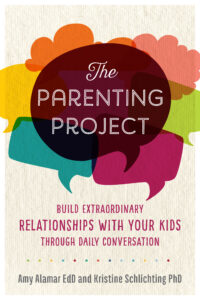First Relationships by Dr. Amy Alamar, author, The Parenting Project (Book Excerpt)
 Heart-based conversations are crucial in defining and maintaining relationships. The relationship you have with your child is the foundation for all other relationships in his life. According to attachment theory, as postulated by John Bowlby and Mary Ainsworth, a child’s ability to securely attach to an adult begins within the first year of life. Patterns of consistent love, attention, and caring create this secure bond or attachment.
Heart-based conversations are crucial in defining and maintaining relationships. The relationship you have with your child is the foundation for all other relationships in his life. According to attachment theory, as postulated by John Bowlby and Mary Ainsworth, a child’s ability to securely attach to an adult begins within the first year of life. Patterns of consistent love, attention, and caring create this secure bond or attachment.
According to attachment theory, parents who are inconsistent in their care of their child create anxious-resistant bonds. These parents may sometimes be attuned to their child’s needs and at other times neglectful of their child’s needs. Children raised in this type of environment are typically not trusting of their parents, which can lead them to demonstrate clingy and/or insecure behavior as they look for attention and comfort. Sometimes, children with anxious-resistant bonds avoid seeking contact with their parents and, later, tend to avoid people in general.
Attachment theorists claim that these very early patterns of behavior and bonds carry over to adult romantic relationships and that this relationship pattern becomes a “working model” that each person utilizes in all relationships throughout their lifetime. Therefore, it is essential that we take the time to develop and nurture rock-steady bonds with our children. They will learn how to love, care for, and understand others through their primary relationship with us. This also means they will learn how to argue, disagree, and hurt others based on how they interact with us.
The relationship you have with your spouse, partner, or other close friends and family you co-parent with sets the framework for your child’s relationships in the future. And, if you’re reading this and panicking because you don’t think you’ve provided a strong model, we can assure you that the very fact you’re reading this book suggests you care enough to be good enough. You can break a pattern of dysfunctional relationships—you can start with your children and rebuild the foundation, but it does take effort and consistency.
Friendships are key for tweens and teens. Your kids’ friends and peers are their role models, fan base, and biggest critics. Your child attempts to strike the balance between fitting in and standing out among her peers daily. Her friends are the people she can trust and go to in times of need. Respect that your child depends on her friends, sometimes more than she depends on you. And, kids crave approval from peers, even if you want your child to be her own independent person. All that said, your child still needs you, and you are a safe place for her to turn. While she wants friends’ approval, she also needs your love, comfort, and guidance. Remember, you are the parent, not a friend.
A very important aspect of friendship is developing interpersonal skills and conflict management. Friends can be a reflection of your child—get to know your kid’s friends, and their families if you can. Rather than worry about the influence other tweens and teens have on your child, try to understand them and enjoy the friendship your child shares with them. You don’t have to be the “cool” mom or dad, but make an effort to know the kids in your child’s circle. Make time to be with them, and make them comfortable in your home.
You love your child unconditionally. And, even though you sometimes don’t like to be with your child, you are there for her when push comes to shove. She cannot simply depend on your love, though—she must also learn to love herself. It’s important to help your child develop a relationship with herself. This means she needs to begin to understand who she is and what that means.
Kids need to love themselves and care for themselves. Once they have respect for themselves, they will better understand how their actions represent who they are and how their behavior affects their relationships. And you can help to develop this self-love by talking about how you love your child. The greatest gift we can give to someone else is the feeling that they are understood by another human. Your love will offer your children a model for how they can love themselves.
Intimacy
Building intimacy takes time and trust. It starts for your child with the relationship between the two of you, in the give and take of emotions, trust, and empathy. You can’t control when your child will be moved to connect with you, so look for those opportunities and be ready to seize them.
Start by being a good model in your intimate relationships. Are you kind and loving to others? Do you care for your own family members and friends? Do you allow your child to express himself freely? This doesn’t mean he has to get his way, but that you listen to his perspective and respond in a respectful way. Do you admit when you’re wrong and help your child to see when he is wrong? Avoid holding your child’s errors over his head for a long period—this will help him to see that he can make mistakes, learn from them, and move on, and that you’re someone he can go to through thick and thin.
Share your own feelings and welcome his—even the angry ones. Try to help your child understand and label his own feelings without naming them yourself. And finally, help him by working through problems with him, being a cheerleader, and showing him that you believe in him.
Intimacy can include both friendships and romantic relationships. Intimacy looks different at different ages and with different people, and as your child ages, he will experience deeper, more intimate relationships with a broader set of people. It’s tempting to slow him down. You might not want your son to date, for example, because you’re concerned that he will lose focus on school and friendships. You may not want your daughter to have one best friend because you’re afraid she won’t socialize with a group and if something goes wrong she will be without a friend. While it’s good to teach your children to exercise caution when it comes to intimate relationships, you don’t want to discourage them from forging deep bonds with others. Rather than discourage relationships, question your child about them. And teach your kids to question themselves: “Do you trust this person?” “Why?” or “What gives you pause?”
Often, we link intimacy and sex. And, while sex can be a truly intimate act, it is not the only way our children will find intimacy with others. Some parents prefer their children not develop close relationships outside the family or postpone dating until a certain age. Recognize that each child is different, and some can handle situations that others of the same age cannot. So, rather than teaching your child to avoid intimacy or trying to delay it, encourage your child and talk with him about how to be intimate with others.
Dating can mean many things, and offers an opportunity for your child to test different relationships and form his own identity. You know your child best, and if he doesn’t seem ready to you, then talk about it. Explain why you’d like him to hold off instead of setting a simple “no dating” rule. Perhaps you can come up with a solution that works for everyone. For example, if he is determined to date a specific person, get to know him or her and set limits for what constitutes a date. Maybe he could invite friends along.
Dating is not synonymous with sex, and you should make that clear to your son or daughter. It’s okay to set expectations, but let your child be a part of establishing those as well. You can’t control your child’s physical urges or romantic inclinations, so help him to understand that those desires will play into his decisions and that he has choices. It might help him to know what you hope for him, and to have some of his own expectations; for example, you might tell him you want him to be able to trust the person he is intimate with.

ABOUT THE AUTHOR
Dr. Amy Alamar has worked in the field of education as a teacher, teacher educator, researcher, parent educator, and education reformer for over 15 years. She has conducted significant research in the areas of student stress, parent involvement, learning and instruction, curriculum design and implementation
In 2014, Dr. Alamar’s first book was published. Parenting for the Genius: Developing Confidence in Your Parenting through Reflective Practice (For the Genius Press). The book is a comprehensive guide to becoming a thoughtful and confident parent, with anecdotes and details relating to the guidance and support of children throughout their formative years. Her second book, The Parenting Project: Build Extraordinary Relationships with Your Kids through Daily Conversation (Fair Winds Press), focuses on communication strategies to maintain influence with kids. Dr. Alamar hosted the Parenting from the Trenches on Yellowbrick.me and is a contributor to the Disney parenting website, Babble and the Psychology blog, Hey Sigmund.
Dr. Alamar worked as the Director of Learning and Instruction at Gooru, designing and implementing digital curriculum for K-12 schools. She previously served as the Schools Program Director for Challenge Success at Stanford University.
She is a frequent speaker at parent and faculty groups and was an invited guest of Michelle Obama at the White House for a conversation about kids’ health in 2016.
Dr. Alamar is a married mother of three and a resident of San Francisco, CA,
Tags: dr. amy alamar, having a family, intimacy, motherhood, parenting, raising kids, sex education















